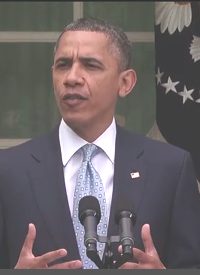
That includes doing everything we can to ensure that an irresponsible few aren’t able to hurt consumers by illegally manipulating or rigging the energy markets for their own gain. We can't afford a situation where speculators artificially manipulate markets by buying up oil, creating the perception of a shortage, and driving prices higher — only to flip the oil for a quick profit. We can’t afford a situation where some speculators can reap millions, while millions of American families get the short end of the stick. That’s not the way the market should work…
So today, we’re announcing new steps to strengthen oversight of energy markets. Things that we can do administratively, we are doing. And I call on Congress to pass a package of measures to crack down on illegal activity and hold accountable those who manipulate the market for private gain at the expense of millions of working families…
Included in this package, funded by the $52 million he’s requesting, would be an increase to six times the number of surveillance and enforcement police at the Commodity Futures Trading Commission (CFTC), an upgrade of computer technology to improve their surveillance of the markets, an increase in penalties for those miscreants caught allegedly doing the manipulating from $1 million per day to $10 million, and a demand that the penalties be applied on each transaction instead of each day.
His call for more government drew immediate criticism from Republicans, including Mitt Romney, who said, “While American families struggle to pay gas prices that have doubled on his watch, the president’s only solutions are to target oil and gas producers for higher taxes and now to dramatically increase federal regulation. These policies will do nothing to reduce energy prices, expand domestic production or strengthen the American economy.”
Joe Pounder of the Republican National Committee (RNC) called the President’s sincerity into question: “Barack Obama must believe the American people can be fooled into thinking he actually has an energy policy.” And the chairman of the House Natural Resources Committee, Rep. Doc Hastings (R-Wash.) accused the President of misdirecting and deflecting attention away from himself and his administration’s policies: “President Obama is once again trying to change the subject and blame something other than his failed energy policies for the skyrocketing price of gasoline. His solution is more regulation, when in fact it’s his regulations that are stifling production.”
A number of economists were also ready to point out his failure to understand how markets actually work. In a free market, supply and demand determine price. When an outside observer notes that, in his opinion, the current price is too low, he might enter the market to buy some to sell later at, hopefully, a higher price. This has numerous benefits, according to Donald Boudreaux, economics professor at George Mason University, including encouraging people to use the high-priced commodity more sparingly, which makes existing supplies last longer. He explains:
Barrels of oil that would, without speculation, have been used today when they aren't so desperately needed are, with speculation, conserved for use tomorrow when they will be more desperately needed.
Surely this result deserves applause.
Besides, isn’t everyone a speculator to one degree or another? A motorist filling her tank in Washington, D.C., was asked by a roving reporter for WTOP Radio about rising gasoline prices:
Customer: My tank is actually way more than half full now. I’m topping it off because I’m sure the price will be even higher this weekend.
Roving reporter: What do you think explains these rising prices?
Customer: Speculators.
RR: Do you think they should be stopped?
Customer: Of course! They’re criminals!
This is called human action: perceiving the future and responding to it. This customer took action that day — buying gasoline that she otherwise wouldn’t have purchased — that puts upward pressure on the price of gasoline today. Is she a criminal? Are professionals who also see what she is seeing and taking action — buying now to sell later — not taking human action? Are they criminals for doing so?
The falsity of the economics informing the President can be exposed by asking: Now that the price of oil, and of gasoline, appears to have peaked and is, at this writing heading down, is that also attributable to the speculators? Are they criminals for driving the price of gasoline down? And what about natural gas? Aren’t there speculators in that market too? And with natural gas prices setting generational lows, are those speculators to blame for that too?
These are all rhetorical questions to be answered in the negative. What is certain is that Obama and his “economic” advisors are interested in riding this situation for all the political benefit the President can gain from it. It’s helpful to remember that, almost exactly a year ago Obama had the same conversation when he announced: “We are going to make sure that no one is taking advantage of American consumers for their own short-term gains.” At the time the President announced he was putting together a task force to investigate oil market manipulations. Whatever happened to that?
The President has a policy: It’s designed to deflect attention away from his own agenda — raising prices to force Americans into using alternative fuels that at present aren’t attractive or profitable — and to attack citizens making their own decisions in what’s left of the free market. More government is always the answer to totalitarians interested in aggrandizing more power in the government even if it is based on economic foolishness.

